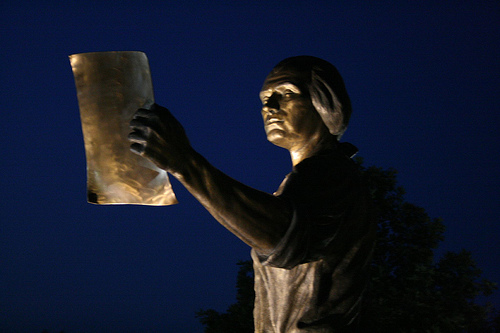* THE ROYALS WIN THE 1985 WORLD SERIES: I don't want to hear your nonsense about Don Denkinger, ok? George Brett, Bret Saberhagen, Steve Balboni,
*Fred was a Royals broadcaster. My mistake.
* GEORGE BRETT HITS A HOME RUN IN GAME THREE OF THE 1980 WORLD SERIES: I was 7 years old. I remember nothing else about this game -- the Royals won, but lost the Series -- except that Brett hit a home run and I was sent to bed. And my dad, who got off work at a meat-packing plant at midnight, came home, woke me up and took me to an all-night cafe so I could tell him about it.
* THE 1991 WORLD SERIES: I loved that two "worst to first" teams -- the Atlanta Braves and Minnesota Twins -- played in it. But my fondest memory of it is that Game 6 was played while my family was at Lake Tenkiller in Oklahoma, celebrating my grandparents 40th anniversary. We sat around a fire and listened to the game on the radio; my grandfather was a Braves fan from constant Superstation exposure. It remains the reason I prefer baseball on the radio to baseball on television.
* PHILLIES WIN THE 2008 WORLD SERIES: I'd only moved to town a few months earlier. But the victory celebration on Broad Street was something to behold. Even if I did end up getting shoved by a riot cop.
* BOSTON RED SOX COME FROM 3-1 TO WIN THE 2004 ALCS: It was the previous year, when Red Sox and the Cubs both appeared to be on the verge of reversing their curses in the playoffs, that brought me back to baseball after a sustained absence. But this series was thrilling. I sat with friends at the Red Lion bar in Lawrence, KS to watch the final games. I'm a sucker for the underdog, even if the underdog has a higher payroll than every team but the Yankees -- because, well, I hate the Yankees.
* VISITING OLD YANKEE STADIUM, 2004: I may hate the Yankees, but I appreciate baseball history. So on a vacation trip to New York I spent $100 for a ticket about 15 rows above the third base line. Walking into the park felt like a cinematic experience. I even rooted for the Yankees that night. Bernie Williams won the game -- and the AL East -- with a walkoff homerun against the Twins. And as the crowd exited to the sounds of Sinatra singing "New York, New York," a chant went up: "Boston Sucks! Boston Sucks!" It was everything I could've hoped for.
* MY FIRST BASEBALL GAME AFTER SEPTEMBER 11. It was a Friday night home game for the Royals, sometime in the next few weeks. Friday night games always concluded with a fireworks exhibition: This one was set to Elvis singing the "Battle Hymn of the Republic" with George W. Bush quotes interspersed into the audio. The combination of Elvis, Bush and explosions in the sky -- and the way it whipped the crowd into a frenzy -- made me think that maybe the War on Terror was going to bring out some very weird sides to the American character.
* THE DIAMONDBACKS WIN THE 2001 WORLD SERIES: Also related to September 11. I was walking the streets of New York, near Ground Zero, right after the Yankees had lost the Series. I'd spent the day immersed in the odors of the still-burning towers -- the flames went on for weeks -- and felt, well, sick of what humanity could do to itself. Then I heard a horn honk. A limo driver rolled down his window to show his Diamondbacks cap to a couple of cops. They cursed at him; he smiled and drove away. And that's when I realized that New York would survive and thrive.
* BILL BUCKNER'S BLOWN GROUND BALL: I rooted for the Mets that year. I'm a sucker for the underdog.





